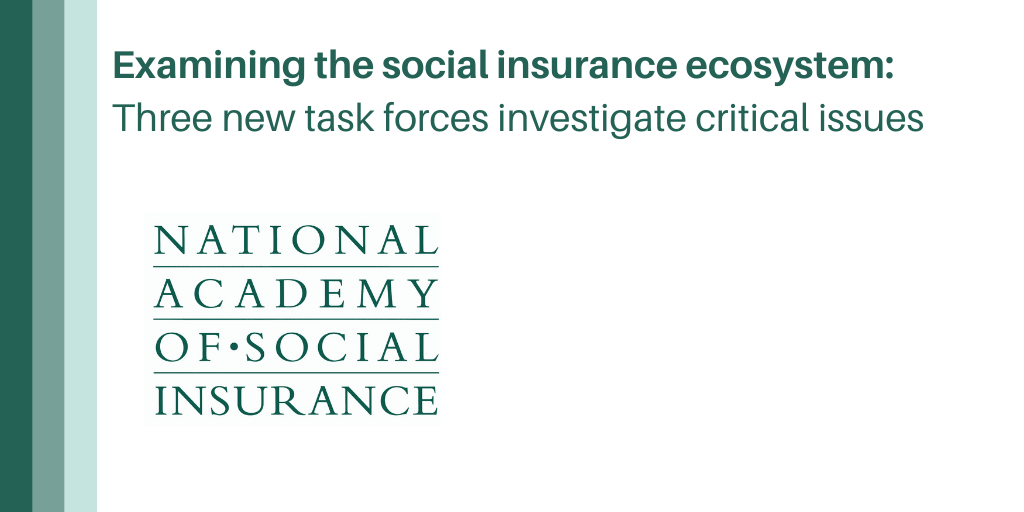William Arnone, Chief Executive Officer
The COVID-19 pandemic has laid bare major weaknesses and gaps in our existing social insurance ecosystem.
The National Academy of Social Insurance is responding with the launch of three new Task Forces to examine critical social insurance issues over the next year.
- The first will be an will be an interdisciplinary task force on how the crises driven by COVID-19 interact with social insurance programs.
- The second will explore potential large-scale reforms to the Unemployment Insurance system.
- The third will explore options to improve retirement security for older workers who are in physically demanding jobs.
Task Force on the Potential Impacts of COVID-19 on the Population, the Economy, and Social Insurance in the United States
This Task Force will assess a range of health and economic consequences of the pandemic on critical factors that affect the funding, benefits, and equity of Social Security and Medicare, as well as implications for Unemployment Insurance, Workers’ Compensation, and proposed social insurance approaches to caregiving and long-term services and supports (Universal Family Care). 25-30 Academy Members and other experts on epidemiology, public health, economics, and public policy will serve on the Task Force.
Researchers have produced numerous COVID-19 studies and substantial epidemiological data, but much of that important information remains inaccessible and may be confusing for the policymakers who need it. The inclusion of diverse experts from a variety of fields will enable the Task Force to compile, distill, and analyze the epidemiological evidence. It will use these findings to assess the potential effects of the COVID-19 virus on the population, as well as translating these impacts into economic implications and possible policy responses for various social insurance programs.
The Task Force will be divided into two working groups: an Epidemiology Working Group and a Policy Translation Working Group. The Epidemiology Working Group will use the assumptions underlying the 2020 Social Security and Medicare Trustees Reports as a starting point and framework for its deliberations. The Policy Translation Working Group will offer a range of social insurance and related approaches that policymakers could take to deal with the pandemic’s impacts, both immediately and over the next several years.
The Academy is seeking additional funding for the full scope of work. We thank the California State Workers’ Compensation Fund, led by Academy Member Vern Steiner, for their early support of this Task Force.
Task Force on Unemployment Insurance
Long before the COVID-19 pandemic and resulting economic crisis, many questioned whether state Unemployment Insurance (UI) programs had the resources and infrastructure to effectively deal with the problems that jobless workers face, even in times of low unemployment. Researchers and others also have asked whether the decentralized federal-state UI system, as currently structured, has the speed, flexibility, and capacity needed to respond to emergencies, and whether a national UI program would better address current shortcomings
The Academy’s new Task Force will explore options for major reforms that will improve the UI system’s effectiveness and equity and enable UI to better fulfill its intended goals of boosting the economy and reducing poverty. 15-20 Academy Members and other experts from diverse backgrounds will serve on the Task Force to reflect the perspectives of workers, employers, state UI system officials, and other stakeholders.
The pandemic has brought into stark relief both national- and state-level weaknesses in the nation’s overall social insurance infrastructure. The weaknesses shine a particularly harsh light on the UI system’s problematic structure, limited resources, and uneven access to benefits across states. These shortcomings do particular harm to the most at-risk workers.
The Academy is receiving a grant from the Russell Sage Foundation, led by Academy Member Sheldon Danziger, to support this study. We are seeking additional funds for the full scope of work envisioned for this project to strengthen UI.
Task Force on Retirement Security for Older Workers
This Task Force will use the Social Security Disability Insurance (SSDI) program as a model to assess options for a broader set of older workers who are no longer able to perform their jobs.
As our 2019 Social Security Innovation Challenge highlighted, many older workers face challenges related to physically demanding work, health problems, and the intersection of the two. While the winning Challenge proposals would boost those workers’ prospects for a secure retirement, there is a need to assess, as well, potential enhancements to the DI system.
The Task Force will bring together a diverse group of 10-12 experts on Social Security administration, disability, retirement security, and other relevant fields to assess such options. Keeping in mind the existing burdens on the DI system, it will ensure no added burden or harm, while identifying strategies to improve retirement security for older workers dealing with physically demanding work.
Thanks to AARP for supporting the Academy’s work on this Task Force as well as the 2019 Social Security Policy Innovation Challenge.
What will the task forces produce and when?
All three Task Forces will launch this fall and winter 2020. Initial issue briefs and reports are expected to begin publishing in late spring and summer 2021. As part of these initiatives, we will also conduct media outreach and hold virtual events, including briefings for targets audiences and stakeholders (e.g., Administration and Congressional staff, employers, unions, advocacy organizations, and more).
How Might Academy Members get involved in the work of these new task forces?
Academy Members with economic, actuarial, and relevant policy expertise, but who are not specifically serving as Task Force members, will have opportunities to provide insights and resources. If you are interested in serving as a potential resource, or have any suggestions or questions about the Task Forces’ scopes of work, please let me know by email at warnone@nasi.org.

